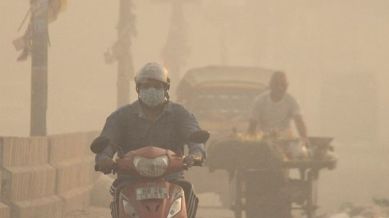Stay updated with the latest - Click here to follow us on Instagram
Mumbai hospitals report rise in respiratory illnesses amid Diwali, temperature fluctuations
As reported by the Central Pollution Control Board's SAMEER app, Mumbai's Air Quality Index (AQI) on Sunday was 157, which falls into the 'moderate' category.

With the rise in pollution levels in Mumbai after bursting of firecrackers during the Diwali celebrations, hospitals across the city have recorded an increase in case of respiratory illnesses.
Hiranandani Hospital reported a 50 per cent increase in respiratory cases over the past few days.
monthly limit of free stories.
with an Express account.
“Asthma exacerbations, bronchitis, and aggravated Chronic Obstructive Pulmonary Disease (COPD) are particularly prevalent around Diwali,” Dr. Sajit Babu, a pulmonologist at the hospital, said.
Firecrackers emit high levels of particulate matter, which can trigger asthma attacks, inflame airways, and worsen COPD symptoms in vulnerable individuals.
“Additionally, many patients experience allergic rhinitis, with symptoms like runny nose, sneezing, and throat irritation. In severe cases, prolonged exposure to polluted air may even elevate the risk of developing or worsening pneumonia, especially in vulnerable groups,” Dr Babu added.
As reported by the Central Pollution Control Board’s SAMEER app, Mumbai’s Air Quality Index (AQI) on Sunday was 157, which falls into the ‘moderate’ category.
This is an improvement from Saturday’s AQI of 208, which was the highest recorded in 2024 so far and classified as “poor”.
“In the past three days, we’ve seen 10-15 cases daily of respiratory issues directly linked to firecracker pollution,” reported a senior doctor from Sion Hospital.
Many of these patients are from densely populated areas such as Dharavi, where poor ventilation exacerbates respiratory distress.
“During Diwali, the air becomes saturated with pollutants from fireworks, and the lack of ventilation in congested living spaces further intensifies breathing difficulties, leading to worsen asthma, bronchitis, and allergic reactions,” he said.
The doctor emphasised that the pollution spike is affecting not only individuals with respiratory conditions but also those typically healthy, with complaints ranging from throat irritation to severe wheezing.
Dr Nimish Shah, consultant in Pulmonary Medicine at HN Reliance Hospital, pointed out that coughs, often a common post-Diwali complaint, are now taking longer to resolve.
“Many patients need medications such as inhalers (bronchodilators) and antihistamines, and for those with asthma or COPD, a prolonged course with higher doses is frequently required. Steroids may also be necessary to reduce inflammation and manage symptoms effectively,” he explained.
Dr Shah added that the effects of air pollution are clear in patients who report symptom improvement when visiting areas with cleaner air.
“By process of elimination, it’s evident that air pollution is a key factor in prolonged respiratory symptoms,” he said.
As Mumbai moves on from the Diwali celebrations, rising temperatures complicate the situation. The forecast shows maximum temperature around 35 degrees Celsius and minimum of about 26 degrees, with relative humidity fluctuating between 51 and 87 per cent.
In the next 24 hours, temperatures in the city and suburbs are expected to reach around 36 degrees Celsius and drop to 23 degrees.
With Diwali pollution and seasonal changes affecting air quality, healthcare providers are preparing for an increase in respiratory cases.
Dr Mihir Gangakhedkar, consultant pulmonologist at Fortis Hospital, observed a 10 per cent rise in respiratory issues over the last two weeks, linked to cooler seasonal temperatures that can worsen conditions like asthma and COPD. “We’ve seen more upper respiratory infections and exacerbations,” he noted.